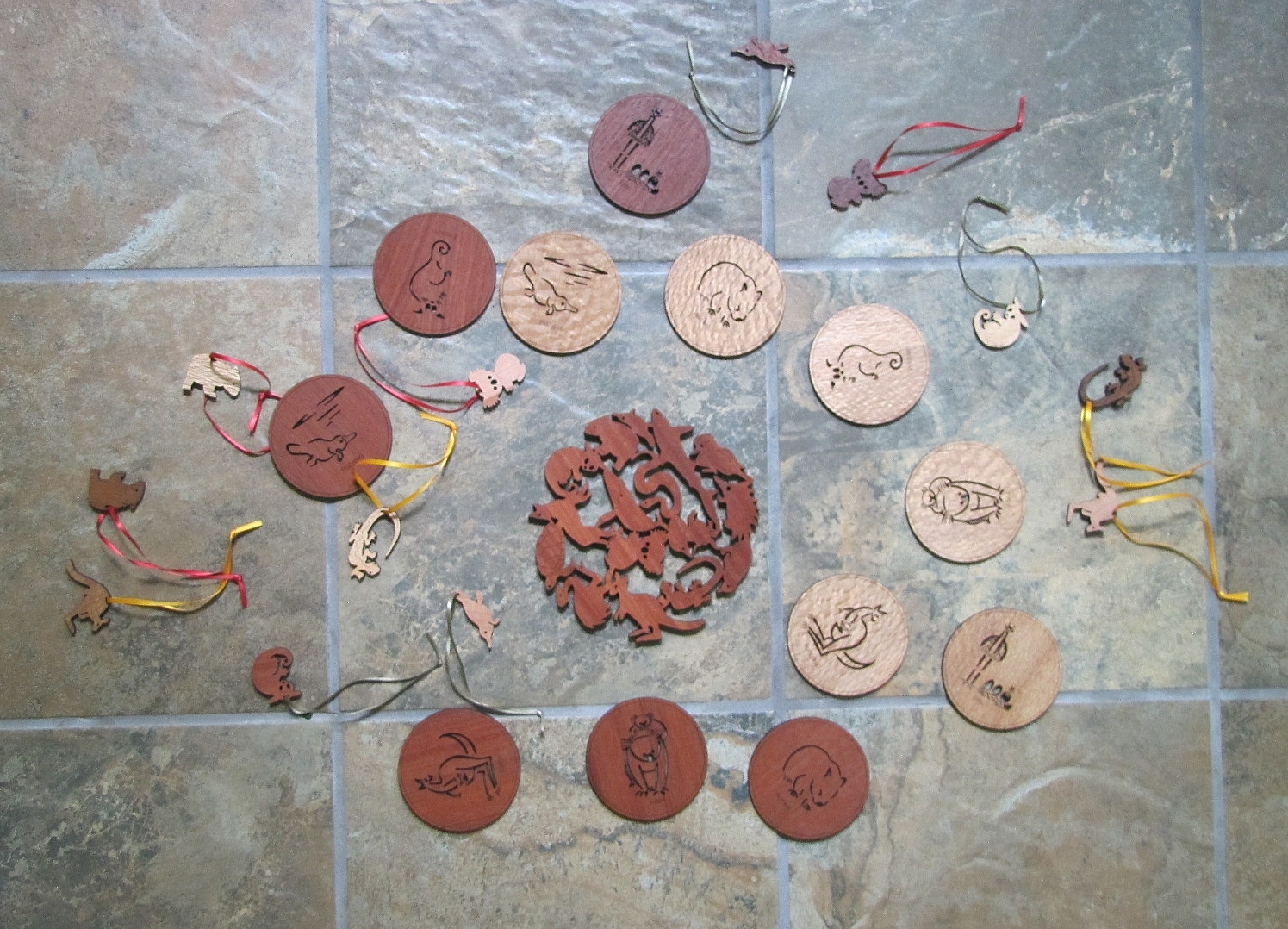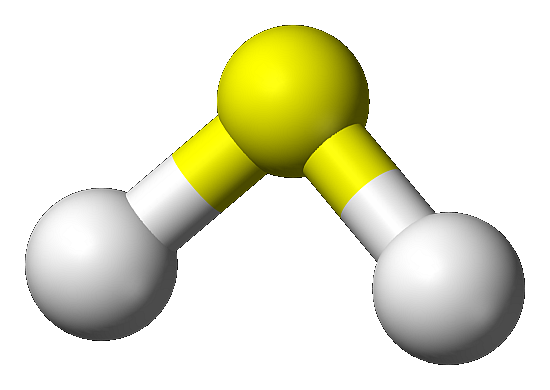The Sulfide Solution. (Also, Who Sent Me All These Wombats?)
Before we get started: does anyone know anything about these?
They appeared on my doorstep a few days ago, from Australia. No card, no clue. They’re pretty awesome, but they’re also a bit suspicious: I keep remembering that giant wooden rabbit rolling up to the door of the Frawnsh Castle in Holy Grail. Who knows what pathogens or circuitry could be lurking behind these endearing wooden beasties?
Anyone?
*
A paper came out in Aging last month, offered a bit of hope to those of us who don’t want to, you know, die. Eva Latorre et al have managed to “reverse aging” in human skin cells. I put that in quotes because it may not quite be true, despite the fact that one of the actual researchers used those words in a commentary on the subject; the actual paper states that the treatment
“has a senostatic, rather than a senolytic or a proliferation-inducing function in the majority of senescent cells in the culture.”
In other words, it doesn’t reboot old cells into full-on mitosis mode; just makes them more metabolically youthful (and the paper leaves open the possibility that maybe they would have started proliferating again but for the “higher mutational load” of older cells). So at the very least, we’ve got senescent cells acting young. They regain functions lost to age and entropy: notably, alternative splicing— that trick whereby a single gene gets repurposed in different sequences for the synthesis of multiple proteins— reattains its youthful vigor. If the process ports to other cell types, Latorre et al cautiously speculate that their technique
“may have therapeutic potential in the future for extension of health span and treatment of age-related diseases… treatment may be able to retard, as well as partially reverse senescence.”
We’re talking life extension here, folks. We’re talking another hopeful step on the road to immortality. And they did it all with hydrogen sulfide.
That surprised me. I’d always assumed H2S was a bad thing for us eukaryotes: poisonous, corrosive, and flammable, a byproduct of anaerobic metabolism that smells like farts[1]. But it turns out it exists in our own bodies, turns out we actually produce the stuff ourselves. It’s beneficial in small quantities; they call it a “gasotransmitter” (along with, believe it or not, carbon monoxide). Apparently H2S helps protect stressed cells from damage. It even has anticancer properties.
Naturally, the paper’s got a fair bit of attention in the popular science press. There’s one thing that none of those articles have mentioned, though. This is not the first time hydrogen sulfide has proven useful in a medical— even in a life-extension— context. Way back in 2005, Blackstone et al exposed mice to 80ppm H2S and reduced their metabolic rate by 90%, with no ill effects. So now we have a simple compound, endogenously produced, which is instrumental both in extending life and in suspending animation.
Or, if you want to be lurid about it, in conferring “immortality” and inducing an undead state.

Oh, you know who this guy is, don’t you? From Danil Krivoruchko and his fellow geniuses over at Blindsight.space.
Back when I was writing Blindsight I didn’t put a lot of thought into the mechanism of vampire hibernation. There wasn’t any real need; everything from chipmunks to lungfish go dormant here in real life, so it’s not like I had to design a novel mechanism from the ground up. Just throw in a couple of offhand references to real-world hibernation peptides and leave it at that.
But this dumb, simple molecule— one ess, two aitches— is looking so damn useful all of a sudden. We already have the pathways, the mechanisms are established— and there are implications to be considered. If vampires have ramped up their H2S pathways, it follows that they’ll have an abnormally high tolerance to sulfide toxicity. Maybe this even implies tolerance to CO and a bunch of other toxic gases. Vampires could be immune to chemical weapons.
This dumb little molecule is starting to inform elements of actual plot.
And I do have another book to write in this series…
[1] Technically, farts smell like H2S, but you know what I mean.










If you write it, I shall buy and read it.
“This dumb little molecule is starting to inform elements of actual plot.
And I do have another book to write in this series…”
I was hoping you were a bit farther along than that…
Wait, so you’re saying the chemical you chose to help explain vampire hibernation also coincidentally serves to explain the traditional vampiric quality of ‘doesn’t age’? Lucky.
Don’t forget Sunday Ahzmundin and her colleagues in their long duration suspended animation aboard Eriophora. H2S might be part of their preservation process
Then you should drop by more often. I have to write a whole other novel before I even start on Omniscience…
Yeah. I mean, what are the odds? At this rate, I expect a paper to come down the pike in the next year or two showing a relationship between hydrogen sulfide metabolism and susceptibility to really bad sunburn…
Do-Ming. Oh, Do-Ming.
From “The Island”, 2010.
How soon they forget.
> Vampires could be immune to chemical weapons.
That feels fucking scary. Like apocalyptically scary. Admittedly Blindsight’s world is chock full of OTHER apocalyptically scary shit but this just feels potentially fucking *horrible*: vampires carrying chemical weapons, striding through the angry clouds without any protective gear while the baseline humans scream and gurgle.
“And I do have another book to write in this series…”
Imagine you’re an author.
😉 can’t fucking wait.
“Timeo Danaos et vombatidae ferentes”
On the other hand, stinking of rotten eggs might not be the most adaptive thing for a hibernating obligate predator of hominids.
Concerning the mystery gifts, I say Australian communists attempting to bring down capitalism by listening in on your conversations ( https://en.wikipedia.org/wiki/The_Thing_(listening_device) ).
That, or they’re as curious about Omniscience and the preceding novel as the rest of us.
Yeah, that’s kind of where I was going. Although whether you consider that necessarily a bad thing probably relates to your take on the Anthropocene as a whole…
I’ve tried. Believe me, I’ve tried.
That would have thrown me in the days before Google Translate.
Now, though, I can’t stop giggling over the fact that “Vombatidae” is a thing.
I’m gonna go out on a limb and postulate that all the hydrogen sulfide would be kept inside. In the same way we don’t leave little mists of red blood cells swirling in our wake.
Might make an interesting side-effect in case of injury, though. “Take that to the heart, you soulless bloosucking—ewww, gross!”
That is so cool. I have to figure out some way of using that in a story somehow.
Just finished watching “The Americans”, and am now a little disappointed that they never found an opportunity to mention The Thing even once over six seasons.
This appears to be the source of your wooden objects:
https://planetcorroboree.com.au/products/6-round-wooden-australian-made-animal-coasters
https://planetcorroboree.com.au/collections/buttonworks-1/products/buttonworks-australian-native-wood-trivet-large-1
As to who sent them, well, that’s still a mystery. Maybe you can contact the company and try and get tracking information?
On another note, it just occurred that you’ve covered at least 2 of the 4 “Universal” monsters (or breakfast cereals, your choice), Dracula, Mummy, Frankenstein and the Werewolf. [Note: do military zombies qualify as Mummy or Frankenstein in this case? Discuss.]
Will you complete the set? Will you create a plausible werewolf with all of the science and imagination at your command? In your next book, Maybe there’s a squad of Werewolf Commandos posted on a Lunar base (y’know, ‘cuz werewolves and the Moon) who get into a scrap with the super-smart vampires. If that’s too “Underworld” for you, maybe…
Werewolves are rogue environmentalist extremists who have altered their bodies to live as part of an animal pack, in order to shine a light on Man’s destruction of Earth’s ecosystem.
I dunno, it sounds batshit to me now that I typed all that out. Maybe you should just ignore this.
But at least you know where that Australian wooden stuff came from.
What you need for eternal life is life.
The information that forms you can be encoded in innumerable ways. So all you need is to do it, either it all or parts of it. Then you multiply it, combine it with elementary codes necessary for survival. You integrate these into as many creatures as possible, spread them across the galaxy, let them fight and evolve in as many directions, into as many environments as possible.
If they’re built by the recipe: First copy the basis code, then wrap everything else around it, without the basis code, no living being – you’ll always have halfway intact spare parts wherever you go. You can be part of the process, start new life, destroy mutants where the basis code changed too much, add chunks of their code to your own, like apps. A whole galaxy as your own fountain of youth, preserving all your data, all your memory, where staying or becoming as much your spitting image as possible is a matter of life and death. And you don’t even have to kill anyone – after all, you just want a drop of their blood. You’ll still have all the blood on your hands they have to shed to preserve your code.
But that’s distant future. At present, let’s stick to the realistic option of fartpires. Don’t impale without a gas mask.
I want another book in the Blindsight/Echopraxia Universe so damn bad it hurts. I loved Freeze-Frame-Revolution (that hidden cliffhanger though! Gwah!!!), but the final omniscience book? I would travel to your doorstep in Canada if that was the only way to get that, and pay any price for it.
I dont think ive ever read, reread, and then read again any book as often as those two. If they just perfected that nifty hibernation thing with Hydrogen Sulfide, i would just let them tuck me in so i wont have to wait for the book, like Cartman did when he wanted the Wii so very bad.
Then again, whatever else you are writing at the moment, i will buy and enjoy that too.
Research into gasotransmitters (low molecular weight gases) is quite interesting with a wide variety of applications. And there is funding, particularly with the evidence of how much money can be made selling pharmaceuticals that increase nitric oxide concentrations in the corpus cavernosum.
So what does that mean in practical terms? If we eat foods that contain H2S, would that have *any* beneficial effects whatsoever?
I’d very much enjoy living a bit longer, even if means eating fart smelling food or supplements.
…”Who Sent Me All These Wombats?)”
Some nut. I’m kind of surprized they fit that into an envelope – couldn’t be a parcel,
because International parcels would have to go (and be registered) at a Post
Office, with a sender’s address. Hmmmm, not sure what would happen if someone
just slipped a large enveope (with the multitude of stamps required for an
International Post item) into a street post box. Maybe(?) it would be let through, after
being run through the scanner, and if it didn’t weigh too much. Without a senders address,
though? Seems unlikely.
Wouldn’t the more interesting question be ‘How did they know where to send it?’
The smell of garlic is based on sulphur compounds, too. If vampire metabolism produced them as a byproduct, garlic smell would really protect you: They would not be able to distinguish between you and one of their own. And it would explain why they got identified and eradicated in any culture where people usually wash.
Ashley R Pollard,
wisdom abounds
Peter Watts,
Leaving aside the nice fact that you might have already explained part of vampire longevity by implicating autism as spmewhat related, where actual autism spectrum disorders along with their sib AD(H)S in some cases might just be evolution’s somewhat imperfect stab at delayed neurodevelopment, e.g. “behave like a 8 year old as a teen[1], but stay somewhat flexible into your seventies”, though I can’t find the Oliver Sacks quote from “Anthropologist on Mars” to that effect…
Whatever, back to H2S. H2S (and CO) bind to the iron in hemes, and one way do buffer it would be to put up a lot of heme in the periphery. Which might lead to some free porphyrins being around, and there is a nice name for that one:
https://en.wikipedia.org/wiki/Porphyria_cutanea_tarda
Though personally I’m not that sure how the heightened senses of vampires would deal with H2S or some other circulating organic sulfur compounds…
As for chemical weapons, H2S and CO are seldom used that way, HCN is another issue, but IIRC it binds somewhat different to hemes.
But then, you could modify TRPV1 to help against pepper spray and some variant or abnormally highly expressed AChE to help against most nerve agents; maybe vampires even create their own carbamates to have an extra reseve, similar to troops likely to encounter organophosphates. As for evolutionary pressure, TRPV1 is implicated in temperature homeostasis, something that is likely divergent in vampires, also in pain perception, and in forming memories[2]. As for AChE, well vampires move faster than baseline humans; e.g. short spurts of acetylcholine that have to go away fast. E.g. lots of AChE…
And now I wonder how vampires would react to LSD or some other psychedelic, deliriants, or weaponized cannabinoids…
[1] When not quoting Dawlins or talking about quantum physics or disrupting history class with some strange anecdotes or reading “The Man who mistook his wife” under the bench, err, sorry, got carried away…
[2] Since all of those are somewhat divergent in actual autism and related syndromes[2a] I actually wonder if there’s a link with TRPV1 in RL
[2a] Any real-life experience with people showing diminuished pain response and having a diagnosis of Borderline PD? Just asking. One of my neighbours, I remember her aquiline nose…
Trottelreiner,
BTW, looking up the genes involved on a chromosomal map might be informative. I’m still somewhat mad about the cadherin gene only present in people with an Y chromosome… 😉
Mark Roth had some military funding to work on scaling up H2S suspended animation for trauma victims about a decade ago. Last I heard, it stopped working around the time you got to sheep-sized.
Perhaps small, wooly vampires.